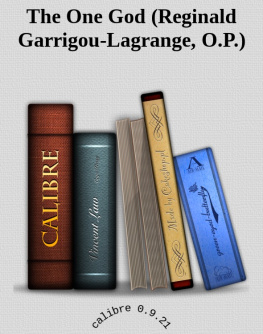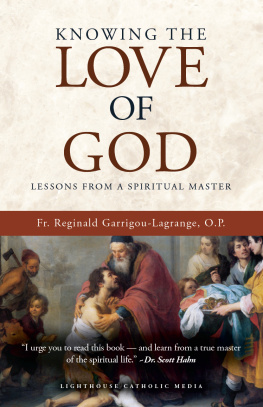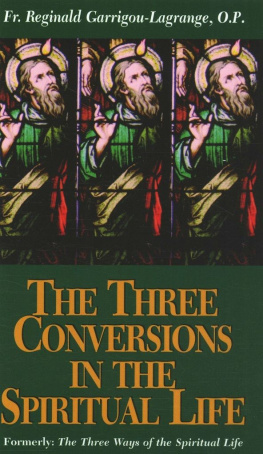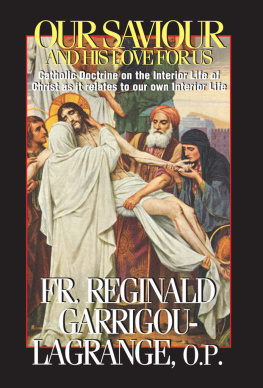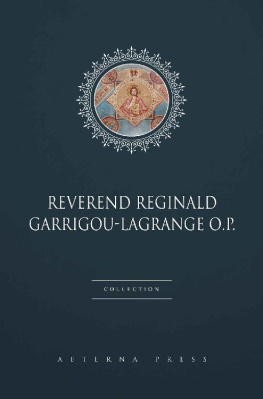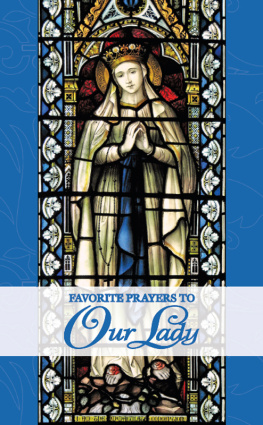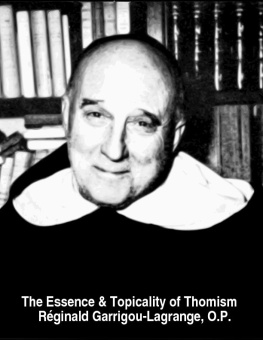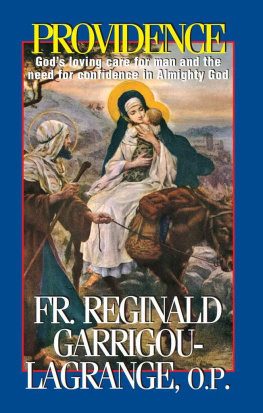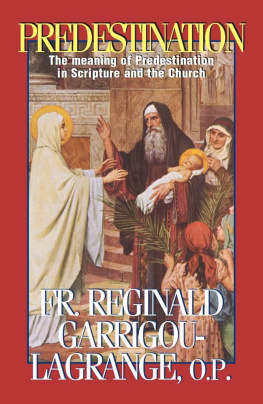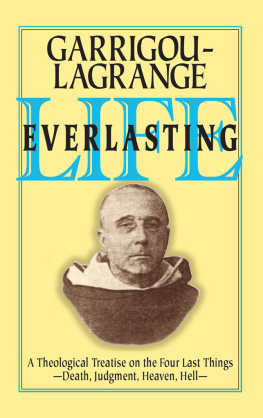The One God
Reginald Garrigou-Lagrange, O.P.
Ch 1 Sacred Doctrine
Ch 2 The Existence of God
Ch 3 Gods Nature and Attributes
TRANSLATORS PREFACE
Theology is the queen of sciences. Many, who are not Catholics, would seriously dispute this statement, and a considerable number perhaps would emphatically deny it. Cardinal Newman, in his Idea of a University, declared and proved that no institution of learning (can rightly call itself a university unless it teaches theology. St. Thomas Aquinas in the very first question of his admirable Summa theologica states and proves that theology is nobler than the other sciences. But his appeal is to men who have the faith, who believe there is a God who will reward those that seek Him, as St. Paul assures us in equivalent words.
There is a crying need at the present day for the civilized nations to give up materialism and return to belief in God and acceptance of His revelation with all that this implies. The words of G. K. Chesterton uttered twenty years ago read now almost like a prophecy. He said: The age-long struggle of the Church against heresy, in the technical sense of the word, is over. But another great struggle is approaching. I may not live to see it. Hells next attack will be on that doctrine on which all religion and all morality are based, the existence of a personal, infinite, and eternal God. That effort will be accompanied by a mighty effort to sweep away the standards of Christian purity. What we are experiencing at the present time confirms what Chesterton said.
One of the chief purposes of dogmatic theology is to defend the doctrine of Gods existence and His revelation against all adversaries. For all Christians some knowledge of dogmatic theology will prove most beneficial . A knowledge of theology is also of great importance for the spiritual life, especially for a deepening of the interior life of communion with God. There is at the present time, even among devout Christians, too much extroversion and too little introversion. The connection between theology and the interior life is shown by Father Garrigou-Lagrange in the Introduction to his commentary on The One God. He points out that there is often too great a separation between study and prayer. He has in mind those who believe in the supernatural, and what he says about study applies not only to theology, but to all branches of knowledge. He sounds a note of warning about sentimentalism in piety, which consists in a certain affected love that is not accompanied by a true and deep love for God and souls. Certainly the emotional element in our nature has its place in the spiritual life, but it must not be allowed to be the standard of judgment in spiritual things. St. Theresa conversed with good theologians, as she says in her Autobiography, so as not to stray from the path of truth. She is referring to theologians who sanctified their study of theology by prayer. What Father Garrigou-Lagrange says in his Introduction on the relation between study and prayer is well worth reading. St. Thomas Aquinas realized the importance of prayer in its relation to study. Whenever an intricate problem presented itself either in theology or in philosophy, he did not spend more time in study, but more time in prayer.
It should not be necessary to stress the importance of the study of theology for the clergy. Yet it is to be feared that too often among priests books on dogmatic theology are relegated to the back shelves of oblivion. After their ordination this branch of knowledge tends to become more and more a forgotten science. Undoubtedly a knowledge of dogmatic theology is of great help in preaching, and the reason why some find it difficult to preach is very often that they have forgotten their dogmatic theology. There is also the danger that many seminarians may approach the study of dogmatic theology in a perfunctory manner, viewing it merely as a study required in the seminary course, but as being of no practical value. Moral theology and canon law are considered of more importance. These sacred branches are necessary, but they should never be allowed to usurp the place of dogmatic theology. It must also be said that the study of dogmatic theology, and especially a perusal of this manual, will be of great benefit to the more educated among the laity. How beautifully St. Thomas discusses the mysteries of our faith in his compendious Summa theologica. All the fundamental principles of moral theology and canon law are to be found in this work of St. Thomas. There have been many Latin commentaries on the Summa theologica of St. Thomas, but it is the opinion of the writer of this preface that there has never been any English translation of any part of any of the Latin commentaries on the Summa theologica of St. Thomas. Without a commentary it is often difficult to grasp all that St. Thomas wishes to convey to the student, since at times he expresses his mind on certain points with a brevity that contains richness of thought. It is to be hoped that this English translation of Garrigou-Lagranges Latin commentary on the first twenty-six questions of the Surnma theologica of St. Thomas will appeal to many of the clergy, students of theology, and the more educated among the laity.
In conclusion I wish to express my deep sense of gratitude to the Rev. Newton Thompson, S.T.D., for his very careful preparation of my manuscript for the printer, and also for his many valuable suggestions.
- Dom Bede Rose, O.S.B., S.T.D.
Footnotes
INTRODUCTION (cont)
The relation between the study of theology and the interior life
There is often too great a separation between study and the interior life; we do not find sufficiently observed, that beautiful gradation spoken of by St. Benedict which consists in: reading, cogitation, study, meditation, prayer and contemplation.(69) St. Thomas, who received his first education from the Benedictines, retained this wonderful gradation when speaking of the contemplative life.(70)
Several defects result from separating study too much from prayer. Thus the hardship and difficulty that not infrequently accompany study are no longer considered a salutary penance, nor are they sufficiently directed to God. Thus weariness and disgust sometimes result from study, without any spiritual profit.
St. Thomas speaks about these two deviations (71) when discussing the virtue of studiousness or application to study, which must be commanded by charity as a check to inordinate curiosity and sloth, so as to study those things which one ought to study, how, when, and where one ought, especially with regard to the spiritual end in view, this being for the acquisition of a better knowledge of God and for the salvation of souls.
To avoid the above-mentioned defects that are opposed to each other, it is good to recall how our intellectual study can be sanctified, by considering first what benefit the interior life receives from a study that is properly directed, and then, on the other hand, what the study of theology can hope to receive in an increasing degree from the interior life. It is in the union of these two functions of our nature that we find the best verification of the principle Causes mutually interact, but in a different order. There is a mutual causality and priority among them, which is truly wonderful.
The indebtedness of the interior life to study
By the study of theology the interior life is especially preserved from the two serious defects of subjectivism in piety and particularism.
Subjectivism, as it applies to piety, is often now called sentimentalism. It consists in a certain affected love which lacks a true deep love for God and souls. This defect arises from the fact the natural inclination of our sensitive nature prevails in prayer according to each ones disposition. An emotion of our sensitivei nature prevails, and this emotion sometimes expresses itself certain outbursts of praise which are quite without solid foundation in reality. In our days several skeptical psychologists, such as Bergson in France, think that even Catholic mysticism is the result of some prevailing and noble emotion that arises from the subconscious self, and that afterward finds expression in the ideas and judgments of the mystics. But a doubt always remains whether these judgments are true that result from the impulse of the subconscious self and the affections.

